Malcolm R. Campbell's Blog, page 25
August 3, 2023
‘My Way’ recorded by Frank Sinatra
 Whether we consider “My Way” as Sinatra’s swan song as he approached retirement, a statement of principles for living, or just a nice song, it’s difficult to hear anyone else sing it. The 1969 song originated with the French song “Comme d’habitude” composed by Jacques Revaux with lyrics by Gilles Thibaut and Claude François that would be translated into English by Paul Anka.
Whether we consider “My Way” as Sinatra’s swan song as he approached retirement, a statement of principles for living, or just a nice song, it’s difficult to hear anyone else sing it. The 1969 song originated with the French song “Comme d’habitude” composed by Jacques Revaux with lyrics by Gilles Thibaut and Claude François that would be translated into English by Paul Anka.
When the song was released, friends on colleagues thought I was full of myself to see the song as a roadmap for my life. “Sinatra’s famous, you’re not. Find a better song.” I suggested “Roll Me Over in the Clover” making people think I really was approaching life my way.
As the song says “Regrets, I’ve had a few, But then again, too few to mention,” and that’s certainly true of anyone who refuses to kow tow to the movers and shakers. In general, I don’t trust the movers and shakers, much less allow them to dictate the rules for a writer’s life.
In terms of regrets in the song, sure, I should have treated a lot of people more fairly than I did, though, many of these folks got bent out of shape because I wouldn’t do things their way. Some of them meant well and some of them didn’t. I had a boss once, the president of the company, who said the firm was in trouble in a department heads meeting because I didn’t do XYZ. I produced a memo from six months prior to that in which I sought permission to do XYZ, his resonse being “absolutely not.” I quit the next day because, as the president, nobody else on the staff was willing to concede that he was the liar.
This is typical of the kinds of scrapes I get into, partly because I don’t trust authority and partly because I think when I’m hired to do a job based my experience, I think the bosses should at least listen. It doesn’t have to be my way when all kinds of compromises and idea-tweeking are obvious. At another company that was really too small to survive, the person doing my exit interview tried to shush me when I said that I was leaving because of “the brain trust who got us into this mess.”
So there it is. “My Way” has probably made life more difficult that it could have been. I’m very stubborn and refuse to compromise on principle in spite of what the powers that be want within the machinations of their own agendas. Both the companies mentioned here went out of business because they wouldn’t face the reality of the arena where they operated.
What about you? Do you think it’s better to keep quiet just to get along with the power structures around you, or call them out?
–Malcolm
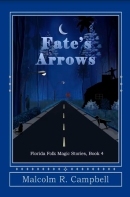 Malcolm R. Campbell is the author of the conjure novel set in the Florida Panhandle in the Jim Crow era.
Malcolm R. Campbell is the author of the conjure novel set in the Florida Panhandle in the Jim Crow era.
August 2, 2023
‘Nothing Like It in the World,’ by Stephen E. Ambrose
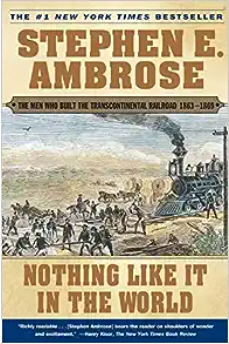 “While originally well received by the public at large, many reviews of the book by professional historians and other scholars, researchers, and experts in the field appearing in the weeks and months after its release were highly critical of the work as being poorly researched and edited as well as inadequately fact checked. Several longer form papers and commentaries were also produced by well-known experts on the history of the Pacific Railroad which documented in detail that the book was rife with factual errors, misquotes, contradictions, demonstrably misleading and/or inaccurate statements, and unsupported conclusions.” – Wikipedia
“While originally well received by the public at large, many reviews of the book by professional historians and other scholars, researchers, and experts in the field appearing in the weeks and months after its release were highly critical of the work as being poorly researched and edited as well as inadequately fact checked. Several longer form papers and commentaries were also produced by well-known experts on the history of the Pacific Railroad which documented in detail that the book was rife with factual errors, misquotes, contradictions, demonstrably misleading and/or inaccurate statements, and unsupported conclusions.” – Wikipedia
I first read this book when it came out in 2001. It was good reading and taught me a lot of things that only received cursory attention in high school and college history courses. Naturally, I was discouraged by the negative reviews the book received over time. Ambrose died in 2002, so her wasn’t around to defend himself. Nonetheless, I still think the book is worth a look because it presents the general story of the road that I doubt most college students graduating with a B.A. don’t know about. Most important are the facts that President Lincoln was the primary force behind a transcontinental railroad and that much of the surveying and other initial work began while the North was fighting a civil war.
From the Publisher“In this New York Times bestseller, Stephen Ambrose brings to life the story of the building of the transcontinental railroad, from the men who financed it to the engineers and surveyors who risked their lives to the workers who signed on for the dangerous job.
“Nothing Like It in the World gives the account of an unprecedented feat of engineering, vision, and courage. It is the story of the men who built the transcontinental railroad—the investors who risked their businesses and money; the enlightened politicians who understood its importance; the engineers and surveyors who risked, and sometimes lost, their lives; and the Irish and Chinese immigrants, the defeated Confederate soldiers, and the other laborers who did the backbreaking and dangerous work on the tracks.
“The U.S. government pitted two companies—the Union Pacific and the Central Pacific Railroads—against each other in a race for funding, encouraging speed over caution. Locomotives, rails, and spikes were shipped from the East through Panama or around South America to the West or lugged across the country to the Plains. In Ambrose’s hands, this enterprise, with its huge expenditure of brainpower, muscle, and sweat, comes vibrantly to life.”
The Central Pacific Railroad started in Sacramento and was built towards the east. It merged with Union Pacific in 1996. At present, the primary class-one railroads which operate freight lines which are often used b Amtrak, are the Union Pacific (UP), Burlington Northern Santa Fe (BNSF), Canadian Pacific (BP) which recently acquired Kanas City Southern, Norfolk-Southern NS), and CSX Transportation.
That first railroad line, along with road operating in the North or South has become quite a sizeable rail network. Watching today’s tack crews add track or repair track gives one an appreciation of the manual work done on the CP by Chinese employees and the work done on the UP by Irish employees.
–Malcolm
Malcolm R. Campbell and his wife worked for a railway museum, restored old cars (including the one used by President Harding, and operated locomotives to move a large amount of rolling stock around the property which grew from 12 acres to 30 acres while we were there.
August 1, 2023
At the end of the day, nothing beats a ‘Hell on Wheels’ town
“As the Railroad marched thus rapidly across the broad Continent of plain and mountain, there was improvised a rough and temporary town at its every public stopping-place. As this was changed every thirty or forty days, these settlements were of the most perishable materials,— canvas tents, plain board shanties, and turf hovels,—pulled down and sent forward for a new career, or deserted as worthless, at every grand movement of the Railroad company. Only a small proportion of their populations had aught to do with the road or any legitimate occupation. Most were the hangers-on around the disbursements of such a gigantic work, catching the drippings from the feast in any and every form that it was possible to reach them. Restaurant and saloon keepers, gamblers, desperadoes of every grade, the vilest of men and of women made up this ‘Hell on Wheels,’ as it was most aptly termed.” – Samuel Bowles, Our New West, 1869.
The towns, which followed the Union Pacific Railroad’s portion of the Transcontinental Railroad through Nebraska and Wyoming, tended to pop up out of nowhere near the end of track to meet the primary needs of hard-working men setting down the track: booze, prostitutes, and gambling. On a more wholesome note there was usually music and dancing and, when a larger settlement was near, a few shops and maybe a church. Generally speaking, there was only one murder per night.

 These towns were portrayed in the 1924 silent film by John Ford called “The Iron Horse,” and later in the “Hell on Wheels” TV series aired between 2011 and 2016 on AMC. These towns did not appear on the Central Pacific section of the road out of Sacramento because that line employed a large number of Chinese workers who found nothing attractive in sex, gambling, and whiskey. Frankly, these towns remind me of certain sections of the liberty ports I saw in the Navy in Japan, Hong Kong, and The Philippines.
These towns were portrayed in the 1924 silent film by John Ford called “The Iron Horse,” and later in the “Hell on Wheels” TV series aired between 2011 and 2016 on AMC. These towns did not appear on the Central Pacific section of the road out of Sacramento because that line employed a large number of Chinese workers who found nothing attractive in sex, gambling, and whiskey. Frankly, these towns remind me of certain sections of the liberty ports I saw in the Navy in Japan, Hong Kong, and The Philippines.
The Union Pacific had more than it could handle in surveying, grading, and putting down rail to bother much with the Hell on Wheels towns, though as Stephen E. Ambrose notes in Nothing Like it in the World (about the creation of the railroad between 1863 and 1869), on at least one occasion the bosses went into a Hell of Wheels town and blasted it to hell. This victory was short-lived.
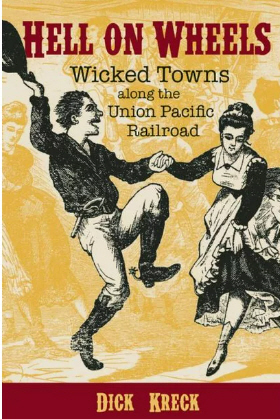 According to PBS “American Experience,” “The most striking feature of these insurgent colonies was their portability. As winter thawed, and the railroaders built toward new towns, agents of vice or enterprise could simply pack up their wares, dismantle their shacks, and follow along on the newly-laid track.”
According to PBS “American Experience,” “The most striking feature of these insurgent colonies was their portability. As winter thawed, and the railroaders built toward new towns, agents of vice or enterprise could simply pack up their wares, dismantle their shacks, and follow along on the newly-laid track.”
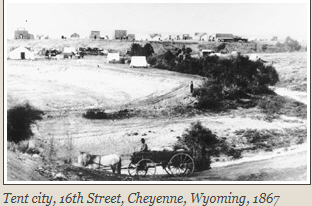 Tent City
Tent City
According to the Encyclopedia of the Great Plains, “The first “Hell on Wheels” town began near Fort Kearny, Nebraska Territory, in August 1866, when the Union Pacific line met Dobeytown, a settlement that existed to provide for the soldiers’ more earthy needs. Fort Kearny (later just Kearney) and North Platte, Nebraska; Julesburg, Colorado; Cheyenne, Laramie, Green River City, and Benton, Wyoming; and Bear River City and Corrine, Utah, were among the primary towns.”
Whether these places were heaven or hell depended on one’s perspective. If heaven, then a few murders were a small price to pay for everything you wanted after pounding spikes all day while fighting off Indians.
–Malcolm
Malcolm R. Campbell is the author of “Conjure Woman’s Cat,” the first novel in the Florida Folk Magic Series.
July 31, 2023
THE HUMAN SPARK THAT DRIVES CREATIVITY MUST BE SAFEGUARDED AS THREATS LOOM FROM ARTIFICIAL INTELLIGENCE
New AI Technologies Have Emerged as a Central Issue in Hollywood’s Writers’ and Actors’ Strikes
PEN.ORG: FOR IMMEDIATE RELEASE
July 31, 2023(NEW YORK)–Warning that generative artificial intelligence could pose new threats to free expression by supercharging deception and repression and infringing on the work of writers and artists, PEN America today released Speech in the Machine: Generative AI’s Implications for Free Expression, an analysis of this watershed technological moment and its implications for civic trust, free speech, creative expression, authenticity and the very notion of truth.

The leading U.S. free expression and writers’ organization, in its new white paper, addresses knowns and unknowns about generative AI tools while offering principles to guide policymakers and others wrestling with the possible impacts on society.
The white paper adds free expression to concerns being voiced over generative AI, warning that the impact on this basic right— for good or for bad— will depend on whether governments and private companies “define and execute their human rights responsibilities.”
The analysis comes as the new technology has emerged as a central issue in the Hollywood writers’ and actors’ strikes, with both groups raising concerns over the use of their creative output and generative AI’s potential to harm livelihoods. Authors have also filed suit arguing that current generative AI models infringe on their copyrights.
“If writers and creators are increasingly displaced by machines, it poses a threat not only to those creative artists, but to the public as a whole,” the white paper states. “The scope of inspiration from which truly new creative works draw may be narrowed, and the very power of literature, television, and film to catalyze innovative ways of thinking may be undercut.” The paper suggests that its use in creative fields could potentially lead to works “that are less rich or reflective of the expansive nuances of human experience and expression.”
Suzanne Nossel, PEN America’s CEO, said: “We cannot afford another failure of imagination when it comes to the ramifications of generative AI for society. As we come to grips with the immense potential of large language models, we need to think expansively about their potential to reshape our workplaces, schools, culture and communities. Large language AI models are innately derivative; the greater their influence the more uniform our television, film and books may become. Their potential to tailor entertainment output to meet user demands may satisfy the consumer while impoverishing our human collective experience. Social media has taught us that once these systems grow to scale, their power to reshape society can outstrip the ability of courts, regulators and even creators themselves to contain potential harms. We are on notice that these risks exist, and bear an urgent responsibility to assess and manage them before AI overtakes us.”
 READ Suzanne Nossel’s essay in The New Republic, “Hollywood’s Fight Against AI Will Affect Us All,” which discusses the potential of generative AI to reshape culture, discourse and our dealings with one another.
READ Suzanne Nossel’s essay in The New Republic, “Hollywood’s Fight Against AI Will Affect Us All,” which discusses the potential of generative AI to reshape culture, discourse and our dealings with one another.
The 36-page PEN America white paper argues that generative AI tools may spur inspiration and ingenuity–or overtake human communication in ways that undercut authenticity in public discourse and the underlying value of open expression.
“Generative AI and automated tools represents a sea change in how artists, journalists, and writers create, interact with, and disseminate content, and how the public understands and consumes it. These changes offer opportunities for new forms of expression and creativity, while simultaneously posing threats to expressive conduct,” the white paper states.
Summer Lopez, chief program officer for free expression at PEN America, said: “Generative AI is on a path to revolutionize how humanity engages with language and information, and to reshape imaginative possibilities across many fields. As these technologies evolve, we must safeguard the uniquely human spark of inspiration that drives the creative process, protect the work of writers and artists from usurpation or exploitation, and anticipate how generative AI can turbocharge existing threats to free expression. We must recognize and head off the risks now.”
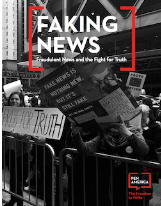 Beginning in 2017, PEN America raised the alarm about disinformation in a prescient landmark report, Faking News, warning about threats – including to the rise of strongman politics and the management of public health crises that were seen then as “far-fetched,” but now reflect reality.
Beginning in 2017, PEN America raised the alarm about disinformation in a prescient landmark report, Faking News, warning about threats – including to the rise of strongman politics and the management of public health crises that were seen then as “far-fetched,” but now reflect reality.
The piecemeal and hotly contested efforts by tech companies and social media platforms to counter disinformation ”may in retrospect look like a mere rehearsal for more disruptive threats posed by generative AI,” the white paper says.
Generative AI is arriving at precisely the moment when key social media platforms like Facebook and Twitter/X have drastically cut staff responsible for online trust and safety.
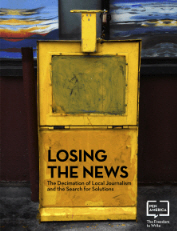 In 2019, PEN America’s Losing the News report documented the collapse of local journalism in the U.S. and consequences for democracy and civic trust, an unforeseen result of the rise of the internet and social media that also highlights the importance of anticipating what implications generative AI may have on the information ecosystem as a whole.
In 2019, PEN America’s Losing the News report documented the collapse of local journalism in the U.S. and consequences for democracy and civic trust, an unforeseen result of the rise of the internet and social media that also highlights the importance of anticipating what implications generative AI may have on the information ecosystem as a whole.
Among other concerns related to free expression raised, PEN America included the following:
Generative AI could further complicate the economic challenges facing journalism, and shrink the pool of jobs in the field, upon which democracy relies. In addition, the technologies could make the creation of fraudulent news sources easier, and the sites themselves more convincing.Generative AI potentially blurs the lines between what is real, what is a human creation, and what is machine-generated, putting at risk the protection and ownership of ideas and posing a potential threat to the livelihoods of writers and artists.The tools are making it cheaper and easier to wield more sophisticated and convincing disinformation campaigns for those with malign intent, as they are also becoming harder to detect. Online abuse campaigns–particularly those waged by governments against their critics–often rely on disinformation and generative AI can be harnessed to catapult disinformation to new levels.Efforts to address the threats posed by generative AI risk censorious or chilling tactics either deliberately, with governments specifically censoring how people can use generative AI, or by using AI’s threats as an excuse to enact new restrictions on expression.Research findings suggest that generative AI tools could be wielded–or weaponized– to manipulate opinions and skew public discourse via subtle forms of influence on their users. AI chatbots designed to reflect a particular ideology could further entrench existing cultural and political echo chambers.Recent efforts by the White House and Congress to address issues posed by generative AI technologies include the Biden Administration’s securing of voluntary commitments from AI companies for safe, secure, transparent development of these new technologies, Senate Majority Leader Chuck Schumer’s SAFE Innovation framework (“security, accountability, protecting our foundations, and explainability”) is meant to guide comprehensive AI-focused legislation following a May Congressional hearing on AI that raised concerns such as harmful content, disinformation, racial bias, and a lack of transparency.
In its recommendations to policymakers, PEN America urges a regulatory approach that incorporates both risk considerations and fundamental rights, noting the importance of–and overlap between–the approaches. Observing what it views as a “false dichotomy” between either a “rights-based” approach to regulation, such as the Biden Administration’s Blueprint for an AI Bill of Rights, or a “risk-based” approach, such as the European Union’s AI Act, the white paper states: “Not only is the rights vs. risk framing unnecessary, some of those documents that purport to fall into one camp or the other are actually both.”
The white paper lays out additional guiding principles for policymakers and industry with regard to this emerging technology. Among these are:
Consultations with human rights advocates, scientists, academics, and other experts to to craft workable policy solutions and ensure regulations support free expression, speech, creativity, and innovationRather than being fixed in perpetuity or requiring consensus to update, regulations should ensure flexibility, such as regular review and adaptation to respond to technological changeRegulators should seek to ensure transparency and access for researchers to algorithms, data sources and uses, and other mechanics of AI technologiesPrioritizing fairness and equity to reduce bias and move closer to building trustworthy systems. Companies can advance these priorities by ensuring AI models are designed and built by diverse teamsSecurity and privacy should provide the foundation for AI system development and deployment with practices such as regular audits or surveys to detect anomalies, protection against attacks by third-parties, and encryption benchmarks to be met.When AI is used to automate decision-making, for example in content moderation, search engine results, or other cases, appeals and remedy options that are accessible and effective must also exist with automated process(es).The business models that will drive the spread of generative AI are only now being invented and refined; as these mechanisms emerge and before they become entrenched, it will be essential to rigorously assess how they shape AI-driven content and discourse.July 30, 2023
‘The Running Grave: A Cormoran Strike Novel’ by Robert Galbraith
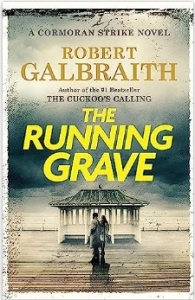 I’m happy to see the upcoming release of a new Robert Galbraith detective novel, the seventh in the series of which I’ve read all but one. The main character, Cormoran Strike, runs a detective agency that does its work without hacking into databases or traffic cams, but by old-fashioned boots on the ground, interviews, and stakeouts.
I’m happy to see the upcoming release of a new Robert Galbraith detective novel, the seventh in the series of which I’ve read all but one. The main character, Cormoran Strike, runs a detective agency that does its work without hacking into databases or traffic cams, but by old-fashioned boots on the ground, interviews, and stakeouts.
This assessment of the novels is especially apt: “At Five Books, we take crime novels seriously, and the Cormoran Strike books are highly recommended for anyone who is into the genre. The tricks to keep you guessing or the surprise about ‘whodunnit’ are not quite as mind-boggling as Agatha Christie, but perhaps more realistic. The plotting is solid and satisfying, and doesn’t grate like in all too many contemporary crime novels.”
From the Publisher“Private Detective Cormoran Strike is contacted by a worried father whose son, Will, has gone to join a religious cult in the depths of the Norfolk countryside.
“The Universal Humanitarian Church is, on the surface, a peaceable organization that campaigns for a better world. Yet Strike discovers that beneath the surface there are deeply sinister undertones and unexplained deaths.
“In order to try to rescue Will, Strike’s business partner, Robin Ellacott, decides to infiltrate the cult, and she travels to Norfolk to live incognito among its members. But in doing so, she is unprepared for the dangers that await her there or for the toll it will take on her. . .
“Utterly page-turning, The Running Grave moves Strike’s and Robin’s story forward in this epic, unforgettable seventh installment of the series.”
The books are long and I see that as good. Running Grave, to be released September 26th by Mulholland Books, gives you 960 pages of whodunnit. It’s listed by Amazon in the “International Mystery And Crime,” “Private Investigator,” and “Cozy Mysteries” categories.
–Malcolm
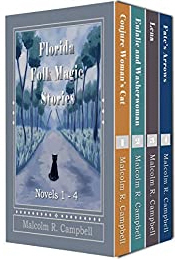 Malcolm R. Campbell is the author of the Florida Folk Magic Series, available at a savings in this four-book Kindle volume.
Malcolm R. Campbell is the author of the Florida Folk Magic Series, available at a savings in this four-book Kindle volume.
July 29, 2023
‘American Prometheus’ – Remembering the book that inspired the movie
“Oppenheimer’s warnings were ignored—and ultimately, he was silenced. Like that rebellious Greek god Prometheus—who stole fire from Zeus and bestowed it upon humankind, Oppenheimer gave us atomic fire. But then, when he tried to control it, when he sought to make us aware of its terrible dangers, the powers-that-be, like Zeus, rose up in anger to punish him.” American Prometheus by Kai Bird and Martin J. Sherwin (2005)
Before the United States was done with Julius Robert Oppenheimer (April 22, 1904 – February 18, 1967), he was declared a security risk by the Eisenhower administration. You learn this on the first page of this definitive, Pulitzer-Prize-winning book about a mystic and theoretical physicist who was as complex as his Nobel-Prize-worthy work that was far flung from nuclear weapons.
From the Publisher
 American Prometheus is the first full-scale biography of J. Robert Oppenheimer, “father of the atomic bomb,” the brilliant, charismatic physicist who led the effort to capture the awesome fire of the sun for his country in time of war. Immediately after Hiroshima, he became the most famous scientist of his generation–one of the iconic figures of the twentieth century, the embodiment of modern man confronting the consequences of scientific progress.
American Prometheus is the first full-scale biography of J. Robert Oppenheimer, “father of the atomic bomb,” the brilliant, charismatic physicist who led the effort to capture the awesome fire of the sun for his country in time of war. Immediately after Hiroshima, he became the most famous scientist of his generation–one of the iconic figures of the twentieth century, the embodiment of modern man confronting the consequences of scientific progress.
He was the author of a radical proposal to place international controls over atomic materials–an idea that is still relevant today. He opposed the development of the hydrogen bomb and criticized the Air Force’s plans to fight an infinitely dangerous nuclear war. In the now almost-forgotten hysteria of the early 1950s, his ideas were anathema to powerful advocates of a massive nuclear buildup, and, in response, Atomic Energy Commission chairman Lewis Strauss, Superbomb advocate Edward Teller and FBI director J. Edgar Hoover worked behind the scenes to have a hearing board find that Oppenheimer could not be trusted with America’s nuclear secrets.
American Prometheus sets forth Oppenheimer’s life and times in revealing and unprecedented detail. Exhaustively researched, it is based on thousands of records and letters gathered from archives in America and abroad, on massive FBI files and on close to a hundred interviews with Oppenheimer’s friends, relatives and colleagues.
We follow him from his earliest education at the turn of the twentieth century at New York City’s Ethical Culture School, through personal crises at Harvard and Cambridge universities. Then to Germany, where he studied quantum physics with the world’s most accomplished theorists; and to Berkeley, California, where he established, during the 1930s, the leading American school of theoretical physics, and where he became deeply involved with social justice causes and their advocates, many of whom were communists. Then to Los Alamos, New Mexico, where he transformed a bleak mesa into the world’s most potent nuclear weapons laboratory–and where he himself was transformed. And finally, to the Institute for Advanced Study in Princeton, which he directed from 1947 to 1966.
American Prometheus is a rich evocation of America at midcentury, a new and compelling portrait of a brilliant, ambitious, complex and flawed man profoundly connected to its major events–the Depression, World War II and the Cold War. It is at once biography and history, and essential to our understanding of our recent past–and of our choices for the future.
From Kirkus ReviewsThat Oppenheimer (1904–67) was a rare genius is beyond doubt; his colleagues at CalTech, Göttingen and Los Alamos were impressed to the point of being cowed by his intellect, and “Oppie” was far ahead of even his professors in the new world of quantum theory. He was a rare bird in other ways as well. A child of privilege whose very luggage excited discussion among his cash-strapped European colleagues, he identified early with left-wing causes and was reportedly better read in the classics of Marxism than most Communist theoreticians; and, though a leftist, he expressed enough fondness for the U.S. that those European colleagues sometimes thought him a chauvinist. Worldly in many ways, he was something of a naïf. In time, he shed some of his clumsiness and became the model of a committed intellectual, unusually generous in sharing credit with students and colleagues and able to wear his achievements lightly. (“I can make it clearer,” he once remarked of a thorny physics problem, “but I can’t make it simpler.”) The authors lucidly explain Oppenheimer’s many scientific accomplishments and the finer points of quantum mechanics. More, they examine his life in a political context, for, though one of the fathers of the atomic bomb, Oppenheimer warned against its proliferation and noted, as early as 1946, that our major cities were now susceptible to terrorist attack, the only defense being a screwdriver—to open “each and every crate or suitcase.” His prescience and conscience cost him dearly: Oppie was effectively blacklisted for more than a decade and rehabilitated only at the end of his too-short life.
A swiftly moving narrative full of morality tales and juicy gossip. One of the best scientific biographies to appear in recent years.
 If the Christopher Nolan feature film has captured your attention and interest in the father of the bomb and you want to know more, American Prometheus is a good starting point. As Wikipedia notes, “The film was released on the same day as Barbie, a fantasy comedy film directed by Greta Gerwig based on Mattel’s Barbie fashion dolls and media franchise, and distributed by Warner Bros. Due to the tonal and genre contrast between the two films, many social media users created memes about how the two films appealed to different audiences, and how they should be viewed as a double feature. The trend was dubbed ‘Barbenheimer’. In an interview with La Vanguardia, Cillian Murphy endorsed the phenomenon, saying ‘My advice would be for people to go see both, on the same day. If they are good films, then that’s cinema’s gain.'”
If the Christopher Nolan feature film has captured your attention and interest in the father of the bomb and you want to know more, American Prometheus is a good starting point. As Wikipedia notes, “The film was released on the same day as Barbie, a fantasy comedy film directed by Greta Gerwig based on Mattel’s Barbie fashion dolls and media franchise, and distributed by Warner Bros. Due to the tonal and genre contrast between the two films, many social media users created memes about how the two films appealed to different audiences, and how they should be viewed as a double feature. The trend was dubbed ‘Barbenheimer’. In an interview with La Vanguardia, Cillian Murphy endorsed the phenomenon, saying ‘My advice would be for people to go see both, on the same day. If they are good films, then that’s cinema’s gain.'”
–Malcolm
July 28, 2023
Where were you October 3, 1992 when someone shouted, ‘Live from New York, it’s Saturday Night!’?
 Two days ago, a Time Magazine story headlined: “The Controversial Saturday Night Live Performance That Made Sinéad O’Connor an Icon.” I agree, it did , but that wasn’t the reaction at the time. Then, and probably up to the day she died, the reaction was pure hatred and scorn for her protest against the Catholic Church about a problem that had for years been obvious to everyone. Even her friends had nothing good to say about her on October 4th and afterwards.
Two days ago, a Time Magazine story headlined: “The Controversial Saturday Night Live Performance That Made Sinéad O’Connor an Icon.” I agree, it did , but that wasn’t the reaction at the time. Then, and probably up to the day she died, the reaction was pure hatred and scorn for her protest against the Catholic Church about a problem that had for years been obvious to everyone. Even her friends had nothing good to say about her on October 4th and afterwards.
She followed a long tradition of protest singers that went back to Pete Seeger, Joan Baez, Bob Dylan and almost everyone else who was singing during the Vietnam War years.
According to Time, “Speaking with the New York Times in 2021, O’Connor said she had no regrets, though the backlash was overwhelming. ‘I’m not sorry I did it. It was brilliant. But it was very traumatizing. It was open season on treating me like a crazy b-tch.'”
Jeremy Smith, writing in Film said, “My memory is tainted by the ensuing smear campaign, a campaign that did not end until today, when Sinéad O’Connor died at the infuriatingly young age of 56 – and I’m probably a fool to believe this denigration will cease just because she’s not around to defend herself anymore. I’ve never seen a popular musician face such unremitting scorn. Not even close. But O’Connor — contrary to the narrative seared into our psyches by a media that could not bear her scorched-earth declaration that the Catholic Church is, charitable works be damned, a factory of institutionally abetted child abuse — never stopped speaking her truth. That continues to be our truth and our shame.”
Well said, and I hope that in time those who slandered her will one day see that she bravely spoke the truth, a truth that most people preferred not to mention.
–Malcolm
July 27, 2023
Thunder and Lightning Salad
 Sara Bradley, who won the recent episode of “Chopped” (a TV show competition on the food network) representing chefs from the south, served a Thunder and Lightning salad. This easy-to-make salad doesn’t have a Wikipedia entry, so I can’t show you a free-to-use photo. The judges liked it, and as they talked about it, I realized that it’s been years since I had it.
Sara Bradley, who won the recent episode of “Chopped” (a TV show competition on the food network) representing chefs from the south, served a Thunder and Lightning salad. This easy-to-make salad doesn’t have a Wikipedia entry, so I can’t show you a free-to-use photo. The judges liked it, and as they talked about it, I realized that it’s been years since I had it.
You can find recipes all over the Internet for it, most with variations from the original that, while fine for experimentation, aren’t the standard which includes several tomatoes, several cucumbers, one Bermuda onion, white vinegar (1/2 cup), and sugar (1/2 cup or a little less to taste). I avoid recipes that include bell peppers since the pepper flavor permeates the whole shebang. White wine, hot sauce, herbs, and Canola oil: forget it.
 Traditionally, the vegetables are cut into large pieces. That is, the tomatoes are cut into wedges, and the cucumbers are peeled and cut into fat slices. The onions are sliced the way you would if you were putting them on a hamburger and cut in half. These are left large so people who don’t like raw onion can pick them out.
Traditionally, the vegetables are cut into large pieces. That is, the tomatoes are cut into wedges, and the cucumbers are peeled and cut into fat slices. The onions are sliced the way you would if you were putting them on a hamburger and cut in half. These are left large so people who don’t like raw onion can pick them out.
Mix up the vegetables and onion in a large bowl. Stir the vinegar and sugar together and then drizzle this over the salad and refrigerate overnight.
This salad goes well with minute steak, pork chops, and even barbecue–or whatever catches your fancy. I have no idea how Sara Bradley made this salad on “Chopped,” so I’ve tried to give you the most basic form. Some people swap Vidalia or other sweet onions for the Bermudas.
And, so sorry for the lack of a photo of the salad.
–Malcolm
July 26, 2023
WH discloses Biden has watched ‘Barbie’ thirteen times
 Washington, D.C., July 26/2023, Star-Gazer News Service–President Biden, who admits he bought the first Barbie doll when it came out in 1959, told reporters that people “who suspect they’re losing their marbles will be returned to sanity to the greatest extent possible by interacting with a Barbie doll collection,” has viewed the new “Barbie” fantasy/comedy film thirteen times.
Washington, D.C., July 26/2023, Star-Gazer News Service–President Biden, who admits he bought the first Barbie doll when it came out in 1959, told reporters that people “who suspect they’re losing their marbles will be returned to sanity to the greatest extent possible by interacting with a Barbie doll collection,” has viewed the new “Barbie” fantasy/comedy film thirteen times.
In spite of stories on Fox News, Press Secretary Karine Jean-Pierre said that charges that Biden stole Vice President Kamala D. Harris’ Barbie doll collection and hid it in the White House China (Dish) Room are “bloody false.”
According to Jean-Pierre, “The President’s doll collection is large enough to withstand acts of God, so he has no need of filching Kamala’s dolls.”
Informed sources say that Biden’s doll collection has been common knowledge amongst reporters who, generally speaking, never mentioned it in print since it would sound like fake news.
Biden, who shared his collection with the 44th U.S. President, Barack Obama for security reasons, said that “while “Barbie” is the epitome of a joyous, transforming movie, “Oppenheimer focuses on the negative, Republican-style view of the cosmos. What sane person goes around saying, ‘Now, I am become Death, the destroyer of worlds.’?”
White House insiders have sworn on a stack of Bibles that the President requires the First Lady, Jill Biden, to wear costumes made popular by the Barbie dolls while the often sits at his Oval Office desk dressed as Ken.
“It’s so sweet,” a White House clerk said, “because it’s human and defines the administration’s approach to political issues.”
Story by Jock Stewart, Special Investigative Reporter
July 25, 2023
ADDITIONAL PARENTS JOIN LAWSUIT AGAINST BOOK BANS IN FLORIDA’S ESCAMBIA COUNTY
FOR IMMEDIATE RELEASE – PEN.ORG
July 21, 2023(PENSACOLA, FL)— Five additional parents today joined a first-of-its-kind federal lawsuit filed earlier this spring challenging the removals and restrictions of books from libraries in a Florida school district that violate their rights to free speech and equal protection under the law.
 The amended suit, led by the free expression organization PEN America, Penguin Random House and a diverse group of authors and parents of Escambia County students, seeks to ensure access to books on a wide range of topics with a wide range of viewpoints. The plaintiffs are represented by Ballard Spahr LLP and Protect Democracy, a non-partisan, pro-democracy group. Read the amended complaint, filed today, here.
The amended suit, led by the free expression organization PEN America, Penguin Random House and a diverse group of authors and parents of Escambia County students, seeks to ensure access to books on a wide range of topics with a wide range of viewpoints. The plaintiffs are represented by Ballard Spahr LLP and Protect Democracy, a non-partisan, pro-democracy group. Read the amended complaint, filed today, here.
This brings the number of parent plaintiffs in the case to seven, with 10 children from diverse backgrounds in elementary, middle and high school. The suit was filed originally on May 17 against the Escambia County School Board asking for books to be returned to school library shelves where they belong. After the complaint was filed, the plaintiffs were granted time to amend it with additional plaintiffs.
“As a Black mother of two teenage girls, I know how important it is for our children to have access to books like The Freedom Writers Diary and Beloved,” said Carin Smith, a parent who joined the lawsuit. “I respect the right of parents to make decisions with and for their own children. In my opinion, we should not shy away from the real, raw struggles this country has faced, and my girls shouldn’t be deprived access to books on those issues because our stories make someone else uncomfortable.”
Benjamin Glass, another parent joining the suit, noted, “Someone with a master’s degree in library science, also known as a librarian, should be deciding what’s in libraries – not politicians. Parents, of course, should be involved in what is in their own child’s best interest to read. But they shouldn’t be making decisions on behalf of other people’s children. You parent your child, I’ll parent mine, and we’ll let librarians do their jobs. That sounds good to me.”
Since the lawsuit was filed in May, the Escambia School District has continued its policies of removing books from school libraries. In that time an additional 21 book titles have been challenged and 17 have been restricted, including Pulitzer Prize winning Middlesex by Jeffrey Eugenides, the landmark graphic novel Watchmen by Alan Moore, and the horror novel It by Stephen King.
“School officials shouldn’t use their authority to force their own ideological convictions on students,” said Suzanne Nossel, CEO of PEN America. “The new plaintiffs have kids in middle and high schools, going through a pivotal time of learning, exploration and intellectual development. We should not be sending them the message that books are dangerous. By defending their freedom to read, we will ensure that schools remain places where students are exposed to complex ideas and stories instead of being taught that society does not trust them enough to allow them to pick up a book.”
The authors involved in the suit, all of whom have either already had their books removed by the district and/or restricted from student access, include author and children’s book illustrator Sarah Brannen, young adult fiction authors David Levithan, George M. Johnson and Ashley Hope Pérez, and children’s book author Kyle Lukoff, all of whom have published works focusing on identities that are historically underrepresented in school libraries.
Lynn Oberlander, counsel at Ballard Spahr LLP, noted, “In removing and restricting access to over 150 books from the libraries on the basis that they expressed disfavored viewpoints, the school board in Escambia County violated the constitutional rights of students, parents, authors and publishers. We are pursuing this case to vindicate those rights, and to stop agents of government from limiting access to ideas and perspectives with which it disagrees in our nation’s schools.”
“The school board is removing books from the school library based on the political views of a small minority,” said Shalini Agarwal, counsel for Protect Democracy. “In removing and restricting the books, the school board is overriding the recommendations of district review committees designed to evaluate books with parent and community feedback. This isn’t simply an affront to parents, it’s a violation of the First Amendment and Equal Protection Clause.”



